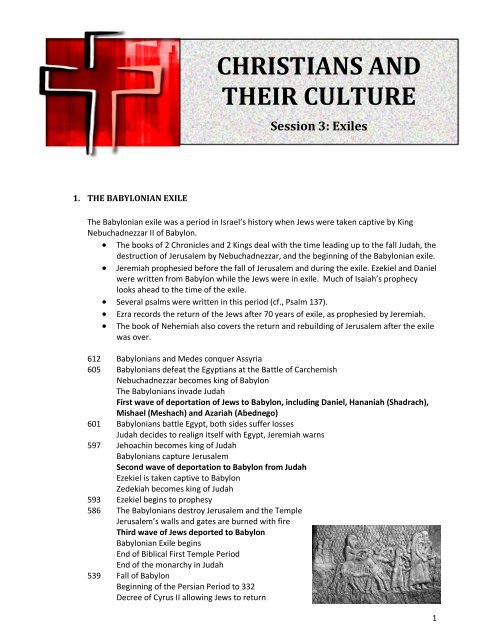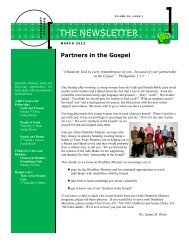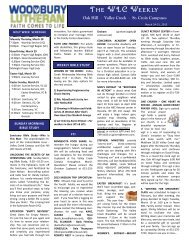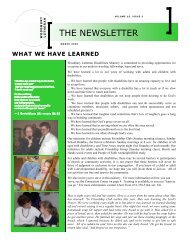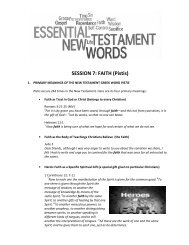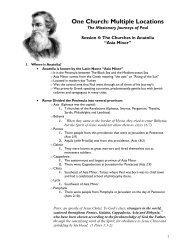Bible Study Handout: Pastor Dean Nadasdy - Woodbury Lutheran ...
Bible Study Handout: Pastor Dean Nadasdy - Woodbury Lutheran ...
Bible Study Handout: Pastor Dean Nadasdy - Woodbury Lutheran ...
Create successful ePaper yourself
Turn your PDF publications into a flip-book with our unique Google optimized e-Paper software.
CHRISTIANS AND<br />
THEIR CULTURE<br />
Session 3: Exiles<br />
1. THE BABYLONIAN EXILE<br />
The Babylonian exile was a period in Israel’s history when Jews were taken captive by King<br />
Nebuchadnezzar II of Babylon.<br />
• The books of 2 Chronicles and 2 Kings deal with the time leading up to the fall Judah, the<br />
destruction of Jerusalem by Nebuchadnezzar, and the beginning of the Babylonian exile.<br />
• Jeremiah prophesied before the fall of Jerusalem and during the exile. Ezekiel and Daniel<br />
were written from Babylon while the Jews were in exile. Much of Isaiah’s prophecy<br />
looks ahead to the time of the exile.<br />
• Several psalms were written in this period (cf., Psalm 137).<br />
• Ezra records the return of the Jews after 70 years of exile, as prophesied by Jeremiah.<br />
• The book of Nehemiah also covers the return and rebuilding of Jerusalem after the exile<br />
was over.<br />
612 Babylonians and Medes conquer Assyria<br />
605 Babylonians defeat the Egyptians at the Battle of Carchemish<br />
Nebuchadnezzar becomes king of Babylon<br />
The Babylonians invade Judah<br />
First wave of deportation of Jews to Babylon, including Daniel, Hananiah (Shadrach),<br />
Mishael (Meshach) and Azariah (Abednego)<br />
601 Babylonians battle Egypt, both sides suffer losses<br />
Judah decides to realign itself with Egypt, Jeremiah warns<br />
597 Jehoachin becomes king of Judah<br />
Babylonians capture Jerusalem<br />
Second wave of deportation to Babylon from Judah<br />
Ezekiel is taken captive to Babylon<br />
Zedekiah becomes king of Judah<br />
593 Ezekiel begins to prophesy<br />
586 The Babylonians destroy Jerusalem and the Temple<br />
Jerusalem’s walls and gates are burned with fire<br />
Third wave of Jews deported to Babylon<br />
Babylonian Exile begins<br />
End of Biblical First Temple Period<br />
End of the monarchy in Judah<br />
539 Fall of Babylon<br />
Beginning of the Persian Period to 332<br />
Decree of Cyrus II allowing Jews to return<br />
1
516 The Jews rebuild their Temple (70 years from 586)<br />
2. LIFE AS EXILES THEN AND NOW<br />
Several observers of North American Christianity, liken our place in our culture to that of the<br />
Ancient Jews during the Babylonian Exile. We have the experiences in common with them:<br />
• Loss. The experience of yearning, abusing, and losing. For exilic Jews they had yearned<br />
for land, abused it when they got it, and lost it. For us, it is the yearning for, abusing, and<br />
losing of political power, respect, and mainstream popularity.<br />
• Worship Not the Same. Exilic Jews lost their temple and their sacrifices. We have lost<br />
worship as we once knew it. Fewer and fewer American Christians worship regularly.<br />
American Christians seem confused as to how God wants us to worship.<br />
• Surrounded by Pagans. Called to be separate, Jews found themselves forced to make<br />
homes in a strange land. They were instructed even by God to settle in and work with<br />
pagans who worshiped idols. Lurking for them was the danger of syncretism (blending<br />
their faith with the pagan religions around them). We face a similar pagan culture today<br />
with same inherent dangers.<br />
Around 593 BC the prophet Jeremiah, still in Judah, sent this letter to the exiles in<br />
Babylon:<br />
4 This is what the LORD Almighty, the God of Israel, says to all those I carried into exile from<br />
Jerusalem to Babylon: 5 “Build houses and settle down; plant gardens and eat what they<br />
produce. 6 Marry and have sons and daughters; find wives for your sons and give your daughters<br />
in marriage, so that they too may have sons and daughters. Increase in number there; do not<br />
decrease. 7 Also, seek the peace and prosperity of the city to which I<br />
have carried you into exile. Pray to the LORD for it, because if it<br />
prospers, you too will prosper.” 8 Yes, this is what the LORD Almighty,<br />
the God of Israel, says: “Do not let the prophets and diviners among<br />
you deceive you. Do not listen to the dreams you encourage them to<br />
have. 9 They are prophesying lies to you in my name. I have not sent<br />
them,” declares the LORD.<br />
10 This is what the LORD says: “When seventy years are completed for<br />
Babylon, I will come to you and fulfill my gracious promise to bring<br />
you back to this place. 11 For I know the plans I have for you,” declares<br />
the LORD, “plans to prosper you and not to harm you, plans to give<br />
you hope and a future. 12 Then you will call upon me and come and<br />
pray to me, and I will listen to you. 13 You will seek me and find me<br />
when you seek me with all your heart. 14 I will be found by you,” declares the LORD, “and will<br />
bring you back from captivity. I will gather you from all the nations and places where I have<br />
banished you,” declares the LORD, “and will bring you back to the place from which I carried you<br />
into exile.” JEREMIAH 29:4-14<br />
• Marginalized. Exilic Jews left a home where their faith was at the center of their culture<br />
(more or less at given times). Now clearly they were a marginalized minority. For us, we<br />
have seen America move from “a Christian nation” to a culture where Christianity is<br />
ignored, ridiculed, and openly attacked.<br />
• Sadness and Despair. Like Jeremiah in Lamentations, we can spend time lamenting the<br />
sad state of the church today, debating the justice of God, and even questioning the<br />
2
power of God. We can take on a survival mode rather than finding hope in God and in<br />
His kingdom. It’s the same Jeremiah who writes, “Why do you always forget us Why do<br />
you forsake us so long” (Lamentations 5:20)” and “Great is your faithfulness”<br />
(Lamentations 3:23).<br />
The sadness of exilic Jews is preserved in this song from Psalm 137, which Christians can<br />
sing today as we face a pagan culture:<br />
1 By the rivers of Babylon we sat and wept<br />
when we remembered Zion.<br />
2 There on the poplars<br />
we hung our harps,<br />
3 for there our captors asked us for songs,<br />
our tormentors demanded songs of joy;<br />
they said, “Sing us one of the songs of Zion!”<br />
4 How can we sing the songs of the LORD<br />
while in a foreign land<br />
5 If I forget you, O Jerusalem,<br />
may my right hand forget its skill.<br />
6 May my tongue cling to the roof of my mouth<br />
if I do not remember you,<br />
if I do not consider Jerusalem<br />
my highest joy. PSALM 137:1-6<br />
3. HOW CHRISTIAN EXILES RESPOND TO THEIR CULTURE<br />
• The experience of exilic Jews not only helps us understand our plight as exilic Christians<br />
in the 21 st Century; it also points the way for a response to our culture. Walter<br />
Bruggemann, in his book, Cadences of Home: Preaching Among Exiles, identified what<br />
he called…<br />
…disciplines of readiness, acts to be undertaken with intentionality and<br />
discipline, to leave us ready if God should make new moves among us. This<br />
new readiness should permit a rethinking of what exiles must do that<br />
usually is not done by preexilic people. This new beginning is a new<br />
circumstance, not easily acknowledged by old-line and mainline faith, a<br />
circumstance that permits and requires fresh disciplines. 1<br />
• More recently Michael Frost, an Australian, has taken four of Bruggemann’s disciplines<br />
of readiness and applied them to contemporary Christians in exile. 2 For Bruggemann<br />
and Frost the disciplines are dangerous in that they threaten both the church caught up<br />
in keeping whatever little ground we have in a pagan culture as well as the culture itself,<br />
which might just be transformed. Labeling these practices ”dangerous” implies that<br />
Christians can be dangerous when turned loose in a culture. What follows is a summary<br />
of Frost’s description of these four dangerous disciplines of exiles.<br />
1 Walter Bruggemann, Cadences of Home: Preaching Among Exiles (Westminster John Knox Press, 1997),118.<br />
2 Michael Frost, Exiles: Living Missionally in a Post-Christian Culture (Peabody, MA: Hendrickson Pub., 2006).<br />
3
1) Dangerous Memories of Jesus and His Agenda. Exilic Jews were encouraged by<br />
the stories of their faith that has been passed on orally for generations and<br />
written down as inspired Scripture – stories on the power and grace of God like<br />
the story of Abraham and Sarah. See Isaiah 51:1-2<br />
Like an experimental farm, the church is to demonstrate living in the Kingdom of<br />
God with generosity and selflessness in contrast to the greed and consumerism<br />
rampant in society. The secret to this is rediscovering<br />
remembering the stories of Jesus. Frost calls the reader<br />
to a fresh understanding of Jesus through first century<br />
Jewish eyes. For example, Jesus' eating patterns<br />
amazinglybroke down social barriers and demonstrated<br />
inclusiveness unheard of in Jewish religion of his day.<br />
Frost insists if we are to imitate Jesus, we will value<br />
hanging out with people in `third places' like clubs and<br />
hotels where people gather regularly and not get overly caught up in meetings<br />
and Sunday stuff (the usual barometer of Christian commitment).<br />
2) Dangerous Promises of God That Point to the Kingdom. Jews in the exile<br />
needed to cling to the promises of God. Those promises defined them as people<br />
who would not merely survive but thrive among the nations as a transforming<br />
source. See Isaiah 54:1-3.<br />
Today the promises of God can create a community bound by its authenticity,<br />
theology, mission, mercy, hospitality, generosity, and righteous work. Frost<br />
favors a life-affirming and not-too-difficult approach to hospitality: “Serve up<br />
something delicious, and then just watch the conversation flow and trust God to<br />
stick His nose in somewhere” (p.168). Dismissing a dualistic approach to secular<br />
work, Frost encourages integrating work and mission.<br />
3) Dangerous Criticism of the Culture. God’s prophets before and after the exile<br />
were not afraid to call out the idolatry of pagan Babylon. See Isaiah 46:6-7.<br />
Christians today must be active in criticizing the waste, greed, injustice, and<br />
idolatry of our culture. We must take the lead in speaking up for the rights of<br />
the disenfranchised, including the unborn, the poor, and the persecuted. This<br />
can happen politically, but it can also happen sacrificially as we respond with<br />
compassion and personal investment to disasters and the needs of the<br />
impoverished.<br />
4) Dangerous Songs That Transform. In the exile, new songs were sung with the<br />
same old message. See Isaiah 42:10-12. Frost, especially here, stretches the<br />
church to consider its music. Do our worship and music carry the sense that we<br />
are dangerous transformers on a mission to change our culture<br />
A few songs and a long sermon won't do. A communal, ambient space,<br />
centered around a convivial meal table, reflecting local culture, using<br />
ancient and modern rituals, and infused with spiritual singing will be a<br />
wonderful expression of the overflow of love lived daily to please our<br />
happy, joyful, all-powerful God (p. 300).<br />
Exiles have given up on singing sentimental, us-centred (`Jesus my<br />
boyfriend') love songs, and want to cry songs that call into reality a<br />
new world brought on by the kingdom of God. And they want to see<br />
4
their actions as well as their songs as an expression of worship.<br />
5


